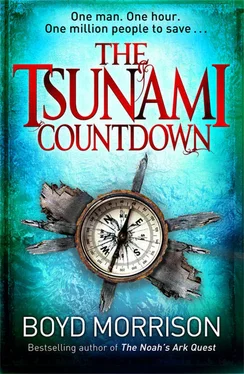Wheeler sprawled across the midsection of Oahu, at least five miles from the nearest shoreline. Already, the air base’s taxiways were jammed with Boeings and Airbuses from seventeen different airlines.
Reggie shared space with countless other displaced government agencies, including other NOAA officials, the National Weather Service, FEMA, even the FBI, all of whose offices were located in the heart of downtown Honolulu. Most of those buildings had already been inundated, and the rest would be underwater in the next hour.
The only working landline telephones were reserved for the U.S. military, and they were in short supply. The cell phone tower that Reggie’s service linked to was still operating, and his cell phone had provided his best news of the day so far.
Reggie had listened to the message from Kai three times to make sure he had the correct information. He tried calling Brad’s cell phone back repeatedly, with no success. He had no way of knowing if the subsequent messages he left had been received, but it didn’t matter: unless he could get a helicopter to them, all the messages in the world wouldn’t save them.
The number of helicopters available was not what it could have been. The sightseeing helicopters were ready to fly because they had been fully booked for the holiday, but many of the armed forces’ helicopters were overseas, lacked pilots, or had been destroyed by the first wave.
The choppers that were left zipped over all the islands, not just Oahu. With thousands of square miles of shoreline and ocean to cover, even the combined forces of the Army, Navy, Air Force, Coast Guard, civilian, and tourist helicopters were stretched thin.
The evacuation had happened so quickly that coordination was nonexistent at the outset. Only now was there some effort to deploy the available aircraft with some sort of organization. Even so, many pilots simply flew around, looking for survivors who were still in the path of the tsunamis.
While he had been trying to find a helicopter for Kai, Reggie had also been hard at work in the midst of all this chaos. Not only did he have to keep the Hawaiian authorities informed of new tsunami activity, but he had to keep the rest of the Pacific apprised of the danger. During the emergency, confusion had reigned. Some agencies hadn’t gotten the updates from the West Coast/ Alaska Tsunami Warning Center, so Reggie had been serving as the local contact in Hawaii.
The PTWC was responsible for warning nations on half the earth’s surface about the coming waves. It still wasn’t over for Hawaii, but it was just starting for twenty other countries and the mainland United States. Reggie assisted Palmer in communicating with every major branch of the government, preparing them for what was about to happen. And the person from the government who offered the best possibility for a helicopter was standing right in front of him.
“What about islands like Wake?” asked Stuart Johnson, an Air National Guard colonel who was acting as the military liaison to all of the American territories in the Pacific for the duration of the disaster. “We’ve got two hundred contractor personnel stationed there.”
“Look,” Reggie said, “Wake is way too flat for people to find any ground high enough to survive. The only thing they can do is get on a plane or a ship and get off the island.” He hoped that building whatever rapport he could with Colonel Johnson would help pave the way for his request.
“We’re already doing that.”
“They’d better be fast. The first wave will get there in about forty minutes.”
“What about Guam?”
“They’ve got a few hours left. If it has land that’s over two hundred feet above sea level, they’ll probably be okay.”
“ Probably? ”
“Colonel, we’re talking about a Pacific-wide mega-tsunami. It’s unprecedented in human history. This isn’t an exact science. We’re taking our best guesses with the data we have. But we estimate that the wave will substantially decrease in size as it gets farther from the impact zone.”
“Why? I thought waves could cross the entire ocean without losing much of their energy. You said that on an old file tape they showed on CNN twenty minutes ago.”
“Oh, man. If you’re confused, I can imagine what’s happening on the mainland right now. That’s for an earthquake-generated tsunami.” Reggie drew a crude representation of a fault on his notepad, showing waves issuing from it. “It only goes in one direction, in a line. It’s very focused. The waves from the meteor impact are in concentric circles, so the energy is spread out over the entire circumference of that circle. As the circle gets bigger, the same energy is spread out over a larger area, and the wave gets smaller.”
“So it’ll be a lot smaller when it reaches the naval base at San Diego?”
“I wouldn’t call a thirty-foot tsunami small. That’s still huge, but it’s nowhere near what we’re seeing on TV now. With the amount of time they have to evacuate, everyone should be able to get to safety before it hits.”
“Dammit! What a mess.” The colonel shot Reggie a nasty look, as if this were all his fault. “I guess I have a lot of work to do.” He turned on his heel to leave, but before he got two steps toward the door, Reggie shoved his huge bulk in front of him.
“Colonel,” Reggie said, “I need a favor.”
“I don’t have time right now.”
“You’ll make time. My friend is stuck on a building in Waikiki. I need a helicopter.”
“Everybody needs a helicopter.”
“This isn’t just anybody! He’s the assistant director of the PTWC!”
“I’ve got orders from General Lambert at CINCPAC that says our highest priorities are the major population centers. Besides that, I’ve got to warn every single base in the Pacific to evacuate.”
“But Waikiki is the biggest population center!”
“Then the helicopters will get to them eventually.”
“ Eventually? ”
“Look, Mr. Pona, I’m sorry about your friend, but I’ve got my orders and so do my helicopter pilots. Excuse me.” He went around Reggie and into the next room, where he started talking with another officer.
Fuming about being brushed off, Reggie made another phone call, this one to the HSCD. After less than a minute of discussion, he walked into the room with Colonel Johnson, interrupting his conversation.
“Pardon me, Colonel, but luckily I had another person who owed me a favor.”
“Look,” the colonel said, exasperated at Reggie’s persistence, “I already told you I can’t help you.”
“I really think you’d better take this phone call.” Reggie thrust the cell phone toward the officer. Colonel Johnson eyed it suspiciously.
“Why? Who is it?”
“It’s the governor. She wants you to give me a helicopter.”
Teresa practically dragged Kai to where Mia was trapped. Instead of finding refuge in one of the ocean-side rooms, Brad, Mia, and Teresa had hunkered down in the kitchen of condo 1004, on the north side of the building facing the explosion.
Kai was stunned by the sight of the ravaged condo. The entire exterior wall was in tatters, and bits of furniture and metal had been propelled into every surface. Even though the kitchen had been shielded from the worst of the blast, it hadn’t come through unscathed.
As Kai had covered Lani during the explosion, Brad had done the same for Mia. When the blast caused a piece of the ceiling to cave in, a steel girder slashed into the wall on one side and smashed the counter on the other, pinning Mia and Brad at their midsections. Although Teresa had been only five feet away, the falling girder had missed her.
“Are you okay?” Kai said to Brad.
Читать дальше












